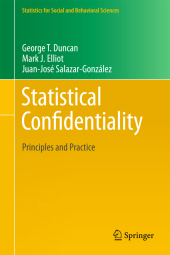 Neuerscheinungen 2013Stand: 2020-01-07 |
Schnellsuche
ISBN/Stichwort/Autor
|
Herderstraße 10
10625 Berlin
Tel.: 030 315 714 16
Fax 030 315 714 14
info@buchspektrum.de |

George T. Duncan, Mark Elliot, Gonzalez Juan Jose Salazar
(Beteiligte)
Statistical Confidentiality
Principles and Practice
Repr. 2013. xii, 200 S. XII, 200 p. 235 mm
Verlag/Jahr: SPRINGER, BERLIN 2013
ISBN: 1-461-42837-8 (1461428378)
Neue ISBN: 978-1-461-42837-4 (9781461428374)
Preis und Lieferzeit: Bitte klicken
For the benefit of those working with proprietary data, this volume embraces the responsibility for both protecting data and ensuring its beneficial use for statistical purposes. The text explores dilemma of data stewardship organizations (such as statistical agencies), identifies risks and provides techniques for statistical disclosure limitation.
Because statistical confidentiality embraces the responsibility for both protecting data and ensuring its beneficial use for statistical purposes, those working with personal and proprietary data can benefit from the principles and practices this book presents. Researchers can understand why an agency holding statistical data does not respond well to the demand, "Just give me the data; I´m only going to do good things with it." Statisticians can incorporate the requirements of statistical confidentiality into their methodologies for data collection and analysis. Data stewards, caught between those eager for data and those who worry about confidentiality, can use the tools of statistical confidentiality toward satisfying both groups.
The eight chapters lay out the dilemma of data stewardship organizations (such as statistical agencies) in resolving the tension between protecting data from snoopers while providing data to legitimate users, explain disclosure risk and explore the types of attack that a data snooper might mount, present the methods of disclosure risk assessment, give techniques for statistical disclosure limitation of both tabular data and microdata, identify measures of the impact of disclosure limitation on data utility, provide restricted access methods as administrative procedures for disclosure control, and finally explore the future of statistical confidentiality.
Why statistical confidentiality?- Concepts of statistical disclosure limitation.- Assessment of disclosure risk.- Protecting tabular data.- Providing and protecting microdata.- Disclosure rRisk and data utility.- Restrictions on data access.- Thoughts on the future.
<font face="Arial" George T. Duncan is Professor of Statistics, Emeritus, Carnegie Mellon University. He chaired the National Academy of Sciences Panel on Confidentiality and Data Access. Mark Elliot is lecturer in social statistics at Manchester University in the UK, consultant to data stewardship organisations worldwide, and inventor of methods for assessing disclosure risk. J.J. Salazar is Professor of Statistics and Operations Research at University of La Laguna (Tenerife, Spain). He has participated in several EU research projects and his algorithms to protect tabular data. are available through the software _-ARGUS He has taught courses on data protection for several national statistical offices.</font


